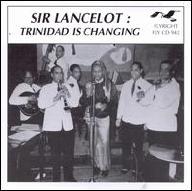Born Lancelot Victor Edward Pinard in Cumuto, North Trinidad, the son of a government official, he began singing at the age of six in a one-hour recital. By the time he was finished with high school, his voice had matured into a perfect tenor instrument, but music didn't seem to be available to him as a career choice -- rather, his father sent him to New York to study medicine. By sheer chance, he was heard singing and invited to try a two-week engagement at the Village Vanguard, which turned into a year-long booking. In 1941, he went out west to play engagements at colleges in California and Oregon, and following a concert in Los Angeles, Sir Lancelot was contracted to make his first screen appearance, in the Pat O'Brien/Janet Blair vehicle #Two Yanks in Trinidad. This appearance, in turn, led to his being booked on tours of Mexico, South America, and the Caribbean.
His first credited film appearance was in the atmospheric Val Lewton chiller #I Walked with a Zombie, where his songs provided ironic commentary on the action of the movie. He later played a dramatic role in Lewton's #The Ghost Ship and #Curse of the Cat People; #Eve Knew Her Apples, starring Ann Miller, #To Have and Have Not with Humphrey Bogart and Lauren Bacall, and #Brute Force starring Burt Lancaster. He was well-known enough by then to play characters simply known as "Sir Lancelot" in pictures as different as the comedy #Linda Be Good and #The Unknown Terror.
Sir Lancelot's singing appearances on radio and television, on shows hosted by Ray Anthony, Ed Sullivan, and Dinah Shore (where he sang the praises of sponsors Ford, Elgin watches, Coca-Cola, and Borden's Milk, and often got more fan mail than Shore herself) planted the seeds of the calypso boom that led the way to Belafonte's rise to fame at the end of the '50s. In 1955, he left the United States for an extended tour of Europe and the Middle East, but returned to Hollywood three years later to appear in #The Buccaneer, a big-budget widescreen historical drama starring Yul Brynner and directed by Anthony Quinn. He continued singing and recording, and made occasional television appearances as late as 1968, when he turned up in a non-singing role in an episode of #The Andy Griffith Show, and continued to record at least through 1973. ~ Bruce Eder, Rovi












